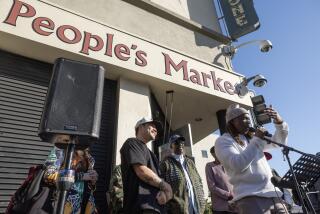FCC Bureaucracy Stalls Fate of Black-Oriented Channel : Television: KEEF, a UHF outlet and one of only two black-owned public stations in the United States, is embroiled in a power struggle.
- Share via
The fate of a black-owned public-television station in Los Angeles that has been kept off the air for more than 2 1/2 years has stalled within the Federal Communications Commission.
“Nothing official is happening on the case pending a recommendation by the (FCC) general counsel’s office on a request to disqualify the judge assigned to hear the case,” explained Rod Porter, deputy chief of the regulatory agency’s Mass Media Bureau.
The petition to remove Administrative Law Judge Joseph Chachkin from a hearing that could end the longstanding dispute over who controls KEEF Channel 68 was filed in March, 1989.
The Los Angeles UHF outlet, operated by the Black Television Workshop and one of only two black-owned public-TV stations in the United States, has been dark since August, 1987. The FCC initially shut the station down for construction violations but then kept it off to investigate allegations that control of the station had shifted without FCC authorization from the original board of directors to another group controlled by station founder Booker T. Wade Jr. KEEF has been in limbo ever since.
Porter would not speculate on the reasons for the 13-month-long delay in receiving a general counsel recommendation on Wade’s petition to disqualify Chachkin on grounds that he was predisposed to rule against Wade.
A spokeswoman for the FCC general counsel office told The Times there would be no comment on any aspect of the KEEF case because “it is a pending matter.”
FCC Chairman Al Sikes also declined to talk about KEEF, and Mass Media Bureau Chief Roy Stewart, whose office investigated the charges against Wade, deferred to Porter, his second-in-command.
“When a party files a request to disqualify a judge,” Porter said, “the proceeding is automatically stopped. Until that request is acted upon, the proceeding remains in a non-active status.”
KEEF had been operating for only four months when the FCC shut it down. A year later, the agency declared that “KEEF-TV’s silence has deprived the Los Angeles community of noncommercial educational television programming intended to meet the needs of its minority populations” and gave permission for the station’s original board of directors to return it to the air, but internal dissension at Black Television Workshop made that impossible.
“Are there any other possibilities of getting the station back on the air? None come to mind,” Porter conceded.
Wade, who could not be reached for comment, created the nonprofit Black Television Workshop in 1981 with the announced goal of building KEEF into the nucleus of a national black-oriented production center. Stymied by his regulatory stand-off with the FCC, Wade has spent more than 14 months trying to sell the station to the Burbank-based Hispanic Christian Communications Network.
The commission, however, has declined to approve any transfer until it settles charges leveled by several members of the original board of directors that Wade, acting then as legal counsel, wrested control of KEEF away from them by exercising provisions of by-laws that they had neither seen nor approved, then failed to properly disclose the change in management to the FCC. Wade has denied the charges.
“I’m not familiar with the case at all,” Commissioner James Quello, a self-described “strong supporter” of public broadcasting, told The Times. “If it’s black-owned, its programs are black-oriented and the black community wants it, I would think those would be pretty strong reasons for putting it back on the air. . . . We wouldn’t take if off in a feckless way.”
More to Read
The biggest entertainment stories
Get our big stories about Hollywood, film, television, music, arts, culture and more right in your inbox as soon as they publish.
You may occasionally receive promotional content from the Los Angeles Times.










